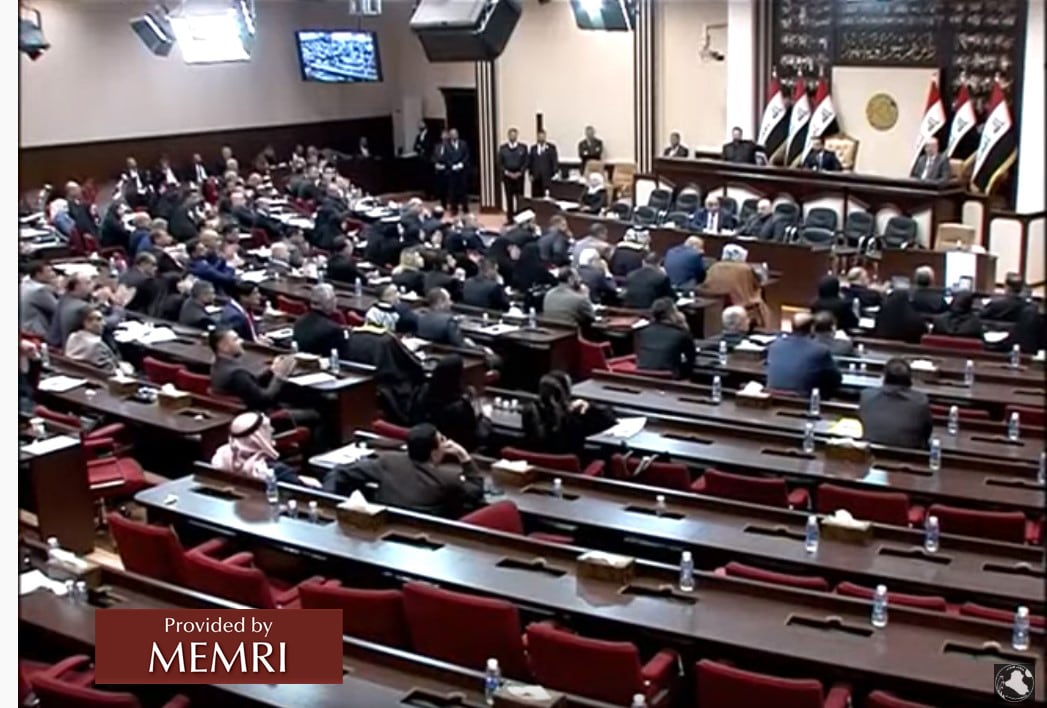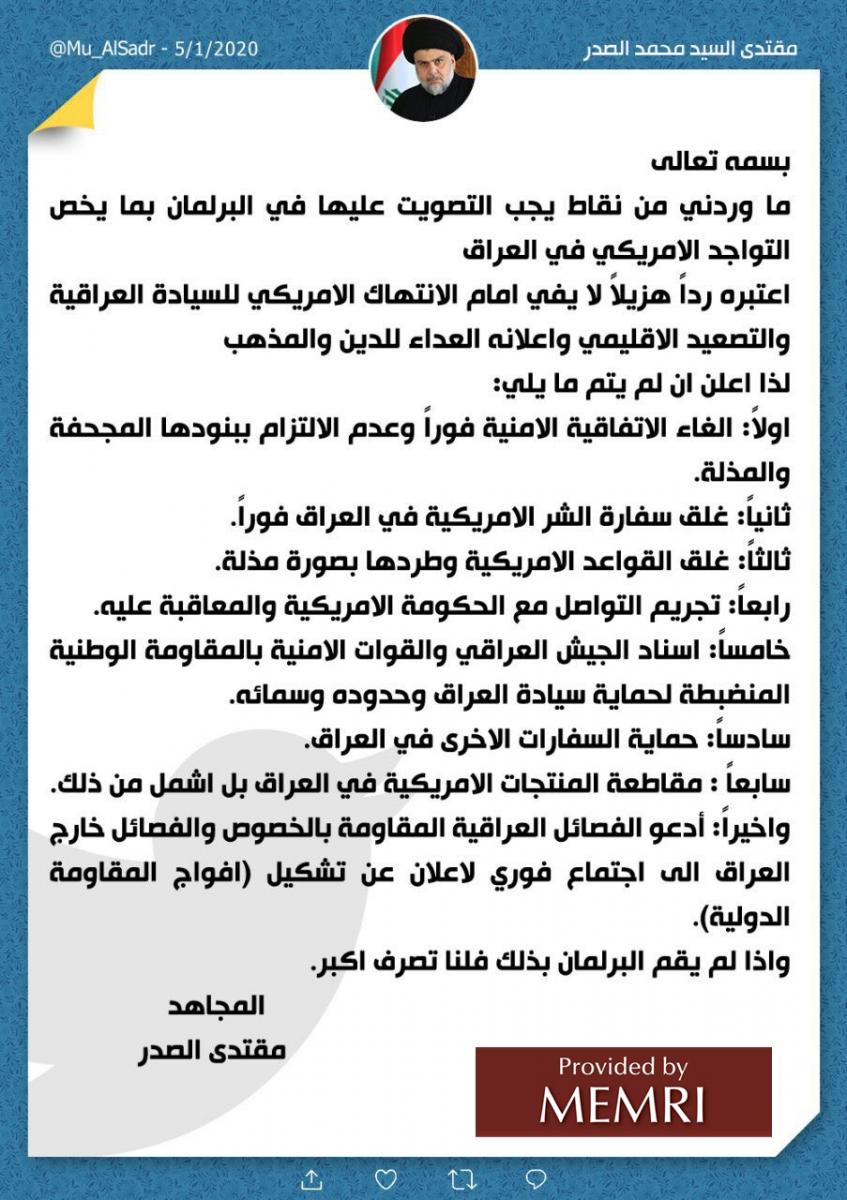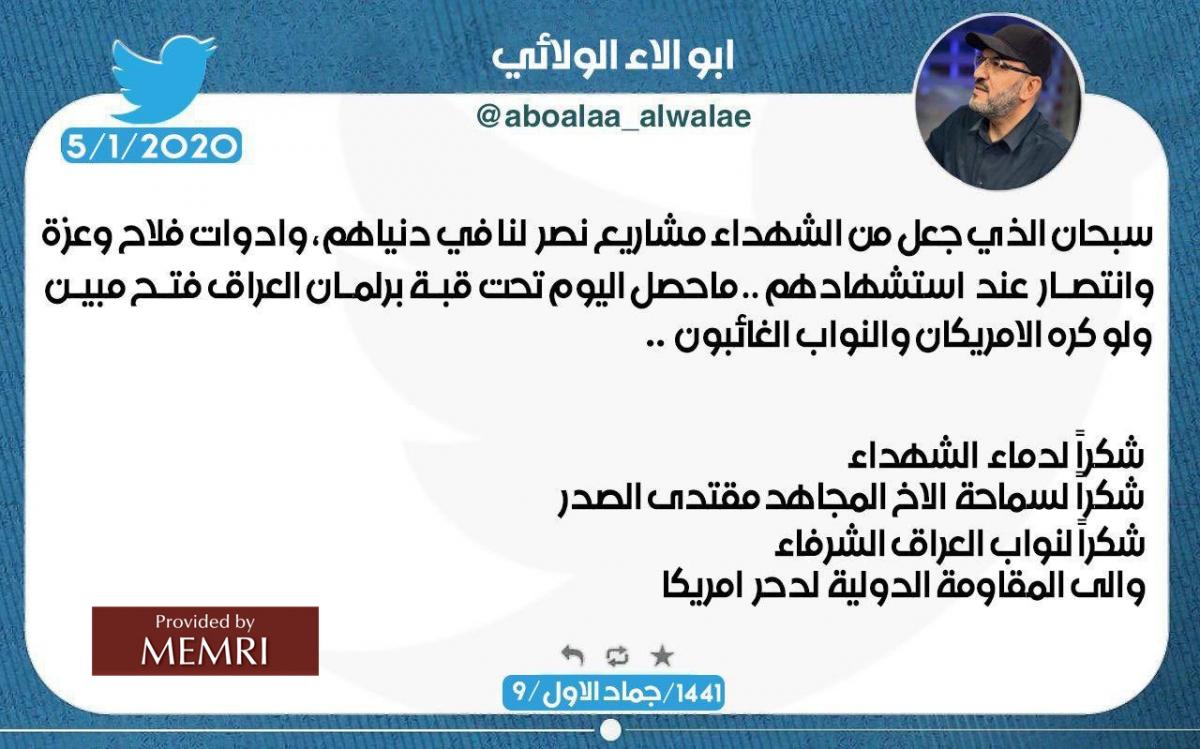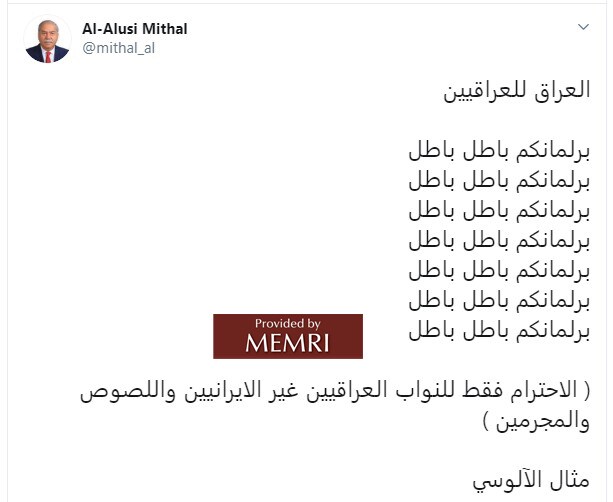On January 5, 2020, 172 Iraqi lawmakers out of 329, which is just enough for quorum, voted to approve a "decision," not a law, to end the presence in Iraq of the U.S.-led international coalition to defeat the Islamic State and to demand that the Iraqi government file an official complaint at the United Nations against the U.S. for killing Iranian General Qassem Soleimani, commander of the Qods Force, which is the foreign operations branch of Iran's Islamic Revolutionary Guard Corps.
A statement[1] issued following the session said that "the Council of Representatives voted unanimously on a parliamentary decision that includes obliging the Iraqi government to cancel the request for assistance that it submitted to the international coalition to fight ISIS to end military and war operations in Iraq since the victory and liberation has been achieved."
Explaining that the request comes in line with "the commitment of the Iraqi government to end the presence of any foreign forces in Iraqi territory and prevent it from using Iraqi lands, water, and air for any reason," the statement noted that the Iraqi government is committed to confining weapons to the state's security institutions alone. It further directed the Iraqi government, as represented by the foreign minister, to urgently lodge a complaint to the United Nations Security Council against the United States of America "for its violations and serious breaches of the sovereignty and security of Iraq."
The statement stressed that the Iraqi government should conduct investigations "at the highest levels to know the causes of the U.S. bombing and inform the Council of Representatives of the results within seven days from the date of this decision, implemented from the date of voting on it." In addition, the statement notes that the Iraqi government must investigate "the possibility of proceeding with the legislation to abolish the Strategic Framework Agreement between Iraq and the United States of America."

Following the extraordinary session of the Iraqi Parliament, the Iraqi Foreign Ministry issued a brief statement[2] saying: "The Iraqi Foreign Ministry raised a complaint in two identical letters sent to both the President of the Security Council and the Secretary-General of the United Nations, through the Permanent Representation of the Republic of Iraq in New York concerning the U.S. attacks on Iraqi military sites, and the assassination of high-level Iraqi and friendly military leaders on Iraqi soil, which resulted in the death of the deputy head of the Popular Mobilization Commission, the Martyr Jamal Jaafar Muhammad (Abu Mahdi Al-Muhandis), along with other martyrs from among the Iraqi and friendly leaders [in reference to Qassem Soleimani], in a serious violation of Iraqi sovereignty and in violation of the conditions for the presence of U.S. forces in Iraq. Iraq called on the Security Council to condemn the bombing and assassinations."
During the parliament session, Iraqi caretaker Prime Minister Adel Abdul-Mahdi presented two options before the Council of Representatives: the first is "to end the presence of the forces with urgent procedures and make arrangements for that," while the second option proposes "returning to a draft resolution that was presented to the Council of Representatives before the formation of the current government."

Iraqi lawmakers during the extraordinary session (screenshot from YouTube video provided by Iraqi parliament website).
Abdul-Mahdi highlighted some details regarding the relationship between Iraq and the United States, and the implications of the January 2 assassination of the "two martyrs" Abu Mahdi Al-Muhandis and Qassem Soleimani. The caretaker prime minister recommended that the first option be adopted, "despite some internal and external difficulties that Iraq might face, as the best in principle and in practice to reorganize healthy relations with the United States and the rest of the countries."
Shi'ite Cleric Muqtada Al-Sadr, leader of the Sadr Movement, later tweeted a statement[3] in which he expressed his disappointment in the "poor response" of the Iraqi parliament that day to the "U.S. violation of Iraqi sovereignty and the regional escalation that represents a declaration of aggression on the religion and the sect [i.e., Shi'ism]."

Al-Sadr demanded that the parliament take harsher actions, including an "immediate cancellation of the security agreement and not abiding by its unfair and humiliating clauses." He further insisted on an "immediate closure of the embassy of evil [i.e., the U.S. Embassy] in Iraq and the closure of U.S. bases, expelling them [U.S. forces] in a humiliating manner." Al-Sadr further required that all of those who communicate with the U.S. government must be "criminalized and punished," recommending that the Iraqi army along with "the disciplined national resistance factions" should be assigned the task of protecting Iraq and other embassies in Iraq. He went further to demand a boycott of American products and called on the Iraqi "resistance factions and the factions outside Iraq for an immediate meeting to announce the formation of international resistance regiments." Al-Sadr concluded his statement with a warning to the parliament saying that if it did not vote in favor of his proposals, he would take harsher actions.
Abu Alaa Al-Walai, leader of Kata'ib Sayyid Al-Shuhada, which is a Popular Mobilization Units (PMU) group, tweeted[4] in praise of the parliament decision saying that "what happened today under the dome of the parliament is a clear victory for Iraq under the nose of the Americans and the absent lawmakers [who did not attend the session]." He thanked the "noble" Iraqi lawmakers, namely cleric Muqtada Al-Sadr and endorsed his call for "an international resistance to defeat America."

Iraqi lawmaker Faiq Al-Sheikh Ali mocked in a tweet[5] the parliamentary session held today, saying it was "humiliating and disgraceful to an important institution." He explained that by legal standards, the outcome of the parliament session "does not mean anything and has no legal or political consequences." As for the political implication, he said: "It is an empty show and empty threats for an agitated people who are eulogizing themselves to the world. To some lawmakers, I say: Show some composure."

Iraqi MP Mithal Al-Alousi condemned in a tweet[6] the parliamentary session, saying: "Your parliament is null and void, respect only for Iraqi non-Iranian representatives, [non-]thieves, and [non-]criminals."

In a related development, Grand Ayatollah Ali Sistani sent today a letter[7] of condolences written in Farsi to Iran's Supreme Leader Ali Khamenei, saying the death of Soleimani was painful for him. "The news of the great General Haj. Soleimani's martyrdom caused me a lot of pain. The role of Haj. Soleimani during his war against ISIS elements was unparalleled. That role and the hardships that he went through in this context cannot be forgotten."

[1] Ar.parliament.iq/2020/01/05/%d9%85%d8%ac%d9%84%d8%b3-%d8%a7%d9%84%d9%86%d9%88%d8%a7%d8%a8-%d9%8a%d8%b5%d9%88%d8%aa-%d8%b9%d9%84%d9%89-%d9%82%d8%b1%d8%a7%d8%b1-%d9%86%d9%8a%d8%a7%d8%a8%d9%8a-%d8%a8%d8%a5%d9%86%d9%87%d8%a7%d8%a1, January 5, 2020.
[2] Mofa.gov.iq/2020/01/?p=7418, January 5, 2020.
[3] Twitter.com/Mu_AlSadr, accessed January 5, 2020.
[4] Twitter.com/aboalaa_alwalae, accessed January 5, 2020.
[5] Twitter.com/faigalsheakh, accessed January 5, 2020.
[6] Twitter.com/mithal_al, accessed January 5, 2020.
[7] Nasnews.com/%D9%86%D8%B5-%D8%B1%D8%B3%D8%A7%D9%84%D8%A9-%D8%A7%D9%84%D9%85%D8%B1%D8%AC%D8%B9-%D8%A7%D9%84%D8%B3%D9%8A%D8%B3%D8%AA%D8%A7%D9%86%D9%8A-%D8%A5%D9%84%D9%89-%D8%AE%D8%A7%D9%85%D9%86%D8%A6%D9%8A-%D9%84, January 5, 2020.




